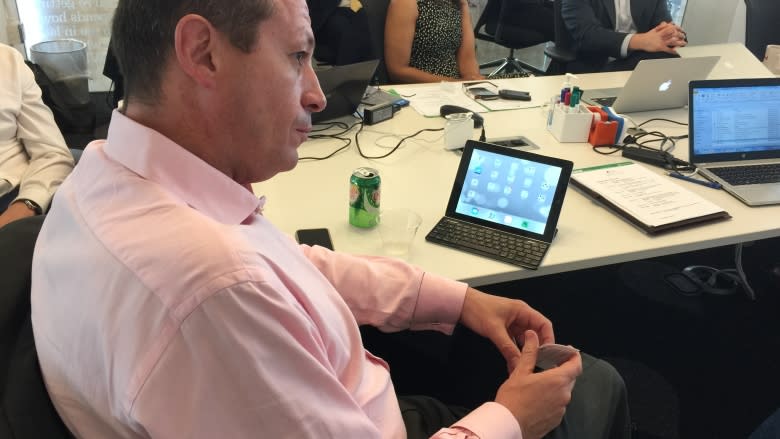Canadian tech companies look to make it big in New York
It has been more than a decade since Ali Asaria left the Waterloo, Ont-based company Research in Motion, as BlackBerry was then called, and even longer since he invented the video game Brickbreaker, the popular time waster on the once ubiquitous device.
It has been so long, in fact, that he says sometimes people don't even know what Brickbreaker is. Now, the Canadian entrepreneur is in New York City, trying to sell what he hopes is the next big thing in retail.
"It's really important for us to be here," he says, sitting in a boardroom in a shared office space near Times Square. "Just being in town, being able to say, 'Hey, I'm in town for a meeting,' it's allowed us to connect to a class of retailer that we never would have been able to unless we moved here ourselves."
He's in New York as part of the Canada Technology Accelerator. Since 2012, the federal program run by the Canadian Trade Commissioner's office selects six to eight companies to bring to New York for four months. They're given office space and mentoring to help gain a foothold in the burgeoning New York tech scene.
Asaria's latest venture is Tulip Retail. It gives sales associates at major retailers an iPad that allows them to better help customers who come into the store after doing research online.
"Before Tulip, customers were walking into stores with more information on their phones than the store associates had," Asaria says.
He is joined in this class by five other companies, including David Ciccarelli, CEO of Voices.com. Based in London, Ont,., the 10-year-old company is an online clearing house for voice-over talent. In the last three years, the staff has grown from 30 to close to 90. With some customers already in New York, coming here was a natural fit.
"It's the capital of the world for media, entertainment, finance and fashion," Ciccarelli said. "That media and entertainment element for us was the one that stood out. There's a lot of prospects."
Companies need a strong balance sheet and clear business plan, and have to set targets that mentors like Pierre-Georges Roy, a Canadian consultant working in New York, keep tabs on.
'No sympathy factor' for being Canadian
Roy says some companies have been sent home because they weren't prepared to handle the fast pace and competitiveness of New York's tech scene.
"Canadian companies that come here are competing with West European companies, Israeli companies, Latin American companies and Asian companies, so it's a worldwide forum," Roy said.
New York's tech sector is known as Silicon Alley, and is focused more on business-to-business products and services, compared to the more consumer-focused Silicon Valley on the West Coast. Recently Silicon Alley was ranked as one of the top five places in the world for startups.
With so much competition, Roy says companies learn quickly that being Canadian doesn't matter.
"Being Canadian is neutral. It's neither a positive or a negative. There's no sympathy factor," he said.
'Time is of the essence'
The companies also learn that New Yorkers don't like to waste time with pleasantries.
"Time is of the essence, even asking for 10 to 15 minutes of people's time is a huge win, and if you can get in front of someone for just a short period, there's no time for small talk, " Ciccarelli said.
Asaria has already lined up a dozen meetings and is speaking at two fashion conferences. He hopes to be able to set up an office here at the end of the program.
Ciccarelli has seen a five-fold increase in business and hopes to set up shop here as well.
"Raising capital in the U.S. or Canada is a 12- to 18-month process. None of this stuff happens overnight, so if i can plant the seeds early enough, I find that when the time is right, then I'll have a dozen relationships and a dozen doors i can knock on."



